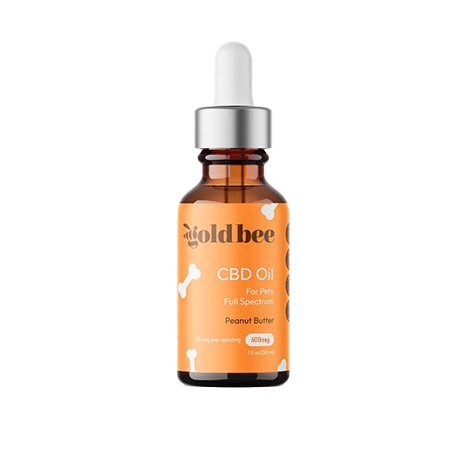Dogs experience cancer just as much as humans do. While there are treatments available, many pet owners choose to skip the treatment in exchange for a more natural approach.
Pet owners are turning to alternative options like CBD oil for two reasons — it’s been shown to alleviate many of the side-effects of cancer therapy, and it may be able to slow the progression of cancer directly.
In this guide, we’ll help you choose the best CBD oil for dogs with cancer and how to use it effectively.
Our Top 5 CBD Oils for Dogs with Cancer
- Royal CBD — Editor’s Choice, Best Overall
- Gold Bee — Runner-Up
- Honest Paws — Best for Pain Relief
- HolistaPet — Most Options
- CBDPure — Best for Small Dogs
1. Royal CBD — Editor’s Choice, Best Overall
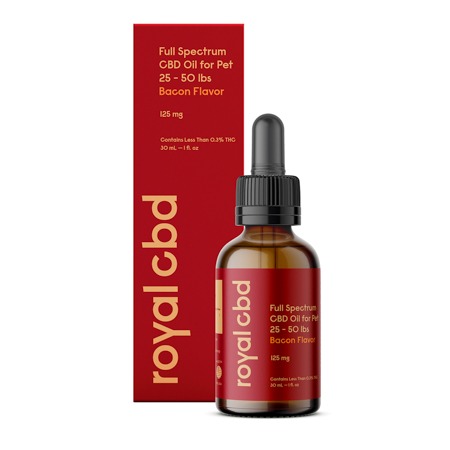 One of the most trusted CBD brands in the market, Royal CBD also offers pet-specific CBD oils perfect for dogs of different sizes. They use full-spectrum CBD oil extracted from organic hemp. The THC content of these oils is well below the 0.3% threshold.
One of the most trusted CBD brands in the market, Royal CBD also offers pet-specific CBD oils perfect for dogs of different sizes. They use full-spectrum CBD oil extracted from organic hemp. The THC content of these oils is well below the 0.3% threshold.
What we loved:
- Extracted from US-grown, organic hemp
- Available in three separate strengths
- Made from gluten-free, non-GMO, natural ingredients
- Bacon-flavored to make it easier to administer to your dog
- Third-party tested for quality assurance
Hemp oil has a naturally bitter flavor — many dogs turn their noses up at the oil and refuse to eat.
Royal CBD uses a bacon flavor in its oils to mask the bitterness and help your dog feel more excited about taking the oil.
2. Gold Bee — Runner-Up
Gold Bee only carries 600 mg potency CBD oil for pets — but the contents of the oil are perfectly suited for use with dogs.
The company knows the value of consumer safety and satisfaction, so we’re always assured that their products went through rigorous testing for safety and potency.
What we loved:
- Sourced from chemical-free, US-grown, organic hemp
- Three different strengths available for dogs of different sizes
- 100% vegan, non-GMO, THC-free
- Peanut Butter flavoring
- Laboratory-tested
Gold Bee’s CBD oil benefits our dogs just as much as it benefits us. It helps control pain and improves common side-effects of cancer therapies, including insomnia and poor appetite.
3. Honest Paws — Best for Pain Relief
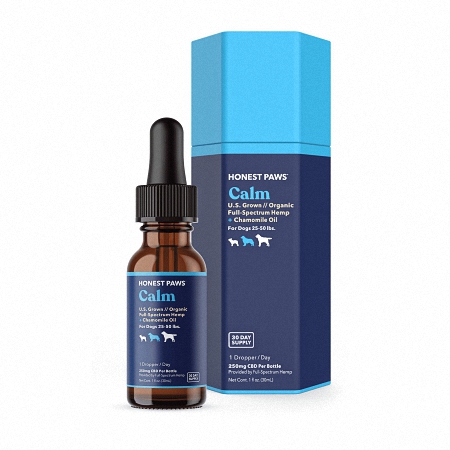
Honest Paws creates specially-formulated CBD oils for specific dog problems.
For pain caused by cancer, we recommend CBD oil for dogs (Relief). Made with full-spectrum CBD oil, it also contains ginger oil, which works very well for controlling pain and inflammation.
What we loved:
- Sourced from organic hemp
- It contains ginger oil for maximum pain relief
- Three unique formulas (Relief is best for dogs with cancer)
- Soy-free, non-GMO
- Third-party tested
Honest Paws also offers other CBD oil formulas that target common dog problems. For stress and anxiety, they have CBD Oil (Calm). This contains chamomile, which is known for its calming effects.
For older dogs suffering from bone and joint problems, CBD Oil (Mobility) with turmeric oil not only reduces pain and inflammation but also eases joint stiffness.
To improve your dog’s overall health, choose CBD Oil (Wellness). This contains essential vitamins that support the immune system.
4. HolistaPet — Most Options
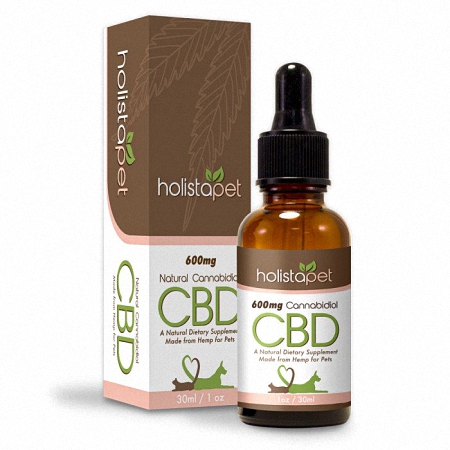
When it comes to CBD oil, HolistaPet offers the most options.
They offer five CBD oils of different strengths, carefully formulating each type to fit different-sized dogs — from the smallest dogs to the largest of the breeds.
What we loved:
- Extracted from US-grown, organic hemp
- It contains superfoods rich in vitamins, minerals, and omega fatty acids
- Five different strengths available
- Dairy-free, gluten-free, vegan, & non-GMO
- Third-party lab tested
HolistaPet is the only pet-specific CBD brand that offers extra-strength CBD oil for dogs.
This means even the largest dog breeds like the Mastiff, Wolfhound, and Great Dane aren’t left out and can also benefit from CBD.
5. CBDPure — Best for Small Dogs
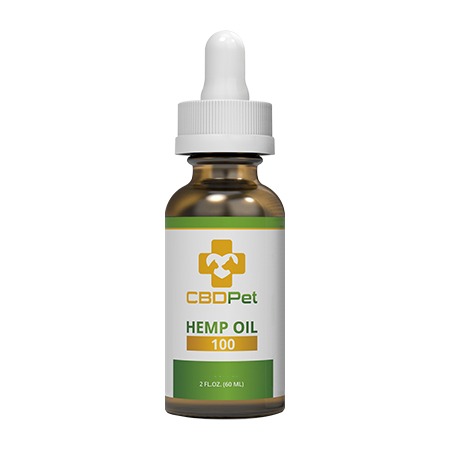
CBDPure’s CBDPet 100 is the best oil for small dogs under 10 lbs. It’s not as potent as the others at only 100 mg of full-spectrum CBD oil per 60 mL bottle.
What we loved:
-
- Sourced from organically-grown hemp
- 100 mg for small dogs less than 10 lbs
- No artificial ingredients or harmful preservatives
- Third-party lab tested
This product isn’t ideal for medium and large-sized dogs. The CBD content per 1 mL may not be enough to control their symptoms effectively.
Can CBD Help With Cancer in Dogs?
Dogs develop cancer, just like humans. In fact, one study showed that cancer is the leading cause of death among older dogs and that 50% of dogs over ten years old eventually develop this disease [1].
Dogs can develop cancer of the skin, brain, liver, bone, lungs, stomach, lymph nodes, breast, and prostate, among others.
While conventional cancer treatment helps, the drugs commonly used to kill cancer cells also produce adverse side effects.
Dogs undergoing cancer treatment sometimes lose their appetite and suffer from severe vomiting and diarrhea. The drugs can also make them more lethargic.
Today, CBD oil is becoming a popular add-on treatment for cancer. It’s safer and nontoxic. It’s also very effective against cancer symptoms and the side effects of cancer therapy.
CBD works primarily through the endocannabinoid system — which is a series of receptors involved with the regulation of homeostasis in the body. Part of this homeostasis involves immune function.
Because our canine friends also have an endocannabinoid system (ECS), using CBD oil can benefit them in the same ways it’s used to support health in humans.
CBD helps your dog’s ECS to function better in maintaining homeostasis and controlling several symptoms.
Admittedly, we still lack studies on CBD and cancer in dogs, but on humans, CBD’s shown a lot of promise as a potential treatment for cancer in dogs.
Below are six potential benefits of CBD oil for dogs with cancer.
1. Reduces Cancer Pain & Low-Grade, Chronic Inflammation
Cancer presses on structures inside the body, damaging them and causing pain and discomfort.
Because cancer damages normal cells, it also triggers low-grade chronic inflammation inside your dog’s body. This prevents healthy cells from recovering and also contributes to pain.
CBD oil has been shown to offer powerful analgesic and anti-inflammatory effects [2]. It works through a combination of the ECS as well as a variety of other receptors tasked with controlling pain and inflammation.
2. Eases Anxiety & Depression
Cancer has been linked to an increase in anxiety and depression in dogs. You’ll notice it in the way they continuously pant, cry or whine in pain. You may also see behavioral changes in your dog like agitation, aggression, or social withdrawal and isolation.
CBD oil has relaxing properties and has been shown to ease the symptoms of anxiety and depression [3].
3. Improves Appetite & Sleep
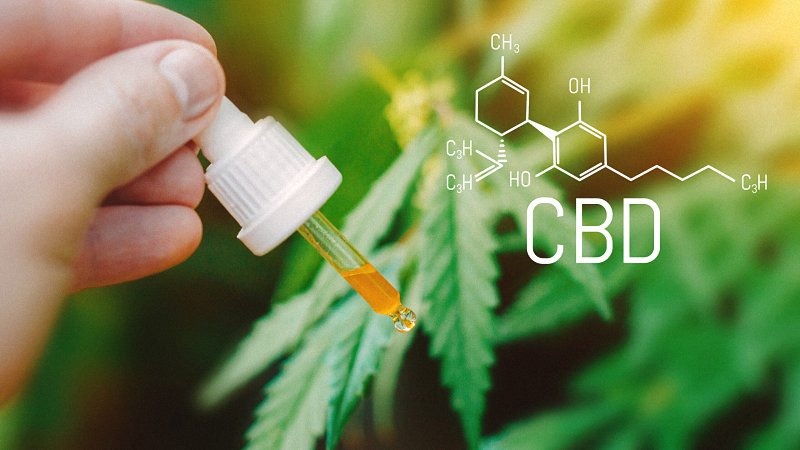
It’s common for dogs undergoing cancer therapy to experience problems with a decreased appetite. This can end up making other symptoms worse over time. Your dog needs a consistent intake of nutritious food and restful sleep in order to fight cancer and keep symptoms at bay.
Studies have shown CBD is able to boost appetite [4]. One of the primary reasons pet owners are using CBD products with their dogs is to improve appetite and restore a healthy nutritional status in sick dogs.
4. Strengthens The Immune System
Cancer weakens the dog’s immune system, making them more susceptible to common illnesses like colds and coughs.
Cancer treatments usually work by preventing cells in the body from dividing. This hurts the cancer cells a lot, but it also harms other areas of the body — such as the immune system and red blood cells.
CBD strengthens the immune system when it stimulates the ECS. It helps the immune system control the growth, development, and proliferation of cancer cells.
5. Delays Cancer Progression
Studies show that CBD has the potential to delay the progression of cancer.
It’s been shown to induce a process called apoptosis — which is commonly referred to as programmed cell death. This is a key mechanism the body uses to tell abnormal cells (such as cancer) to die in order to prevent the spread of the disease.
CBD also blocks angiogenesis — which is the development of blood vessels needed to supply blood and nutrients to a growing tumor. Blocking the production of veins and arteries can slow cancer progression over time.
6. Relieves Side Effects of Cancer Treatments
Cancer treatments help, but they can also produce severe side effects. These include nausea, vomiting, sleep loss, poor appetite, lethargy, fatigue, weight loss, digestive discomfort.
These treatments can also cause pain since chemotherapy drugs damage normal, healthy cells.
Now, CBD helps control these side effects. It reduces nausea and vomiting, and it also decreases pain. CBD also helps your dog gain weight by improving sleep and appetite.
How To Effectively Use CBD Oil For Dogs With Cancer?
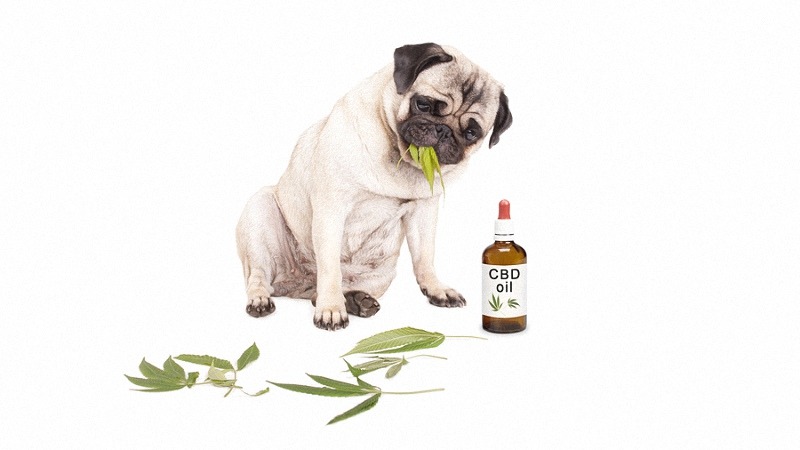
Administering CBD oil to your dogs is easy.
Just follow the instructions on the label for the proper dosage and squirt the amount directly into your dog’s mouth. You can gently hold your dog’s mouth closed to make sure they swallow the oil.
However, if your dog doesn’t like the taste of CBD oil, then you can add it to their meals. This is the most common method for giving CBD oil to dogs because most of the time they won’t even notice.
If your dog is particularly picky when it comes to their food, you may have to go with the tried and tested method of simply dropping it into their mouth and holding it shut for a few moments to ensure they swallow all of it. This won’t hurt your dog, but it may annoy them for a few minutes.
It also helps to go with a flavored CBD oil for dogs to improve the flavor further. Royal CBD’s bacon-flavored CBD oil is a great choice for extra picky animals.
How To Get The Correct CBD Oil Dose For Dogs With Cancer?
So what dose should I give my dog?
The answer really comes down to what oil you’re using. Most companies will provide dosage instructions on the bottle. But it’s also fairly straightforward to figure it out on your own.
For mild symptoms, the rule of thumb is to give the dog 0.25 mg of CBD per 1 lb — and for severe symptoms, you need to give him 0.5 mg of CBD per 1 lb.
For example, your dog weighs 10 lbs., then he will need 2.5 mg CBD for mild symptoms and 5 mg for severe symptoms.
To calculate the milligrams of CBD per 1 mL, divide the total amount of CBD by the size of the bottle.
For example, you bought a 150 mg CBD oil in a 30 mL bottle, then divide 150 by 30. This gives you 5 mg of CBD per 1 mL or one full dropper. Of note, one full dropper contains about 20 drops or 1 ml.
Since your dog weighs 10 lbs., then he’ll need 10 drops or half a dropper for mild symptoms or 20 drops or one full dropper for severe symptoms.
Is CBD Oil Safe For Dogs with Cancer?
Yes, CBD oil is safe for dogs with cancer.
It’s non-psychoactive and non-intoxicating — meaning it’s not going to make your dog feel high.
However, always choose hemp CBD oils that contain less than 0.3% THC. THC, especially in high doses, is dangerous to dogs.
CBD also has side effects like sleepiness and dry mouth, but these typically go away in time and are well-tolerated by dogs.
Conventional Treatment vs. CBD Oil For Dogs With Cancer
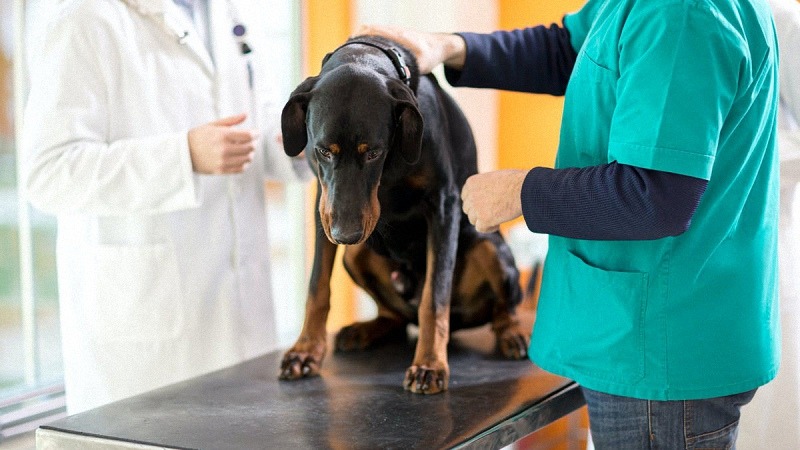
CBD oil may be very beneficial for dogs with cancer, but it should not, in any way, replace conventional cancer treatments.
If you suspect that your dog has cancer, then you need to take him to his vet for a proper diagnosis and treatment plan.
If you want to use CBD oil for your dog, we recommend speaking with his vet first, especially since CBD interacts with some drugs.
What Causes Cancer in Dogs?
Age is not the only factor that increases your dog’s risk of developing cancer. Other factors like genes and the dog’s breed also play a role.
Some breeds like the Golden Retrievers and the Doberman Pinschers are more susceptible to specific cancers. Inbreeding to preserve certain traits and qualities is very common among these breeds. The downside is that the gene pool is becoming even smaller, making it more likely for dogs to inherit bad genes — some of which are involved with an increased rate of cancer.
External factors like poor diet, exposure to carcinogens, and environmental hazards also increase cancer risk.
Signs & Symptoms of Cancer in Dogs
Dogs can’t tell us what’s wrong with them, so it’s our obligation as responsible pet owners to bring them to the veterinarian for regular checkups.
However, there are telltale signs of cancer to watch out for.
If you notice abnormal lumps, swelling, wounds that won’t heal, larger-than-normal lymph nodes, signs of pain, abnormal bleeding, or lethargy — you should take your dog to his vet immediately for proper diagnosis and medical treatment.
These could all be indications of cancer in your dog.
Conventional Cancer Treatment for Dogs
Diagnostic tools like X-rays, CT scans, and other imaging tests look for the presence of abnormal growths in your dog’s body. Blood work and biopsies are also taken for analysis to find markers that could indicate cancer.
Once the diagnosis of cancer is confirmed, the vet will prescribe chemotherapy, radiation therapy, or surgery to prevent cancer growth and stop it from spreading.
In many cases, a combination of any or all of the cancer treatment options may be recommended.
The treatment cost depends on the severity of the disease. It can range from $1,000 for simple surgeries to as high as $15,000 for combination therapies.
Final Thoughts — Best CBD Oils For Dogs With Cancer
CBD oil could be a great addition to your dog’s cancer treatment regimen. It has beneficial properties that may alleviate side-effects of treatment and improve your dogs’ ability to fight cancer on their own.
At the very least, it’s likely CBD will be able to improve your dogs’ quality of life in their final days.
You should always find a reputable CBD brand. Cheap CBD oils often contain insufficient concentrations of CBD or other cannabinoids in the oil — which won’t offer anywhere near the level of benefit you’d expect when using CBD with your dog.
Our favorite brand for use with dogs is Royal CBD. Their oil contains a rich source of active CBD and other cannabinoids, terpenes, and other phytochemicals associated with the oil’s anti-cancer benefits.
References Cited in This Article
- Davis, B. W., & Ostrander, E. A. (2014). Domestic dogs and cancer research: a breed-based genomics approach. ILAR Journal, 55(1), 59-68.
- Russo, E. B. (2008). Cannabinoids in the management of difficult to treat pain. Therapeutics and clinical risk management, 4(1), 245.
- Zuardi, A. W., Cosme, R. A., Graeff, F. G., & Guimarães, F. S. (1993). Effects of ipsapirone and cannabidiol on human experimental anxiety. Journal of Psychopharmacology, 7(1_suppl), 82-88.
- Mechoulam, R., & Hanus, L. (2001). The cannabinoids: an overview. Therapeutic implications in vomiting and nausea after cancer chemotherapy, in appetite promotion, in multiple sclerosis, and in neuroprotection. Pain Research and Management, 6.


